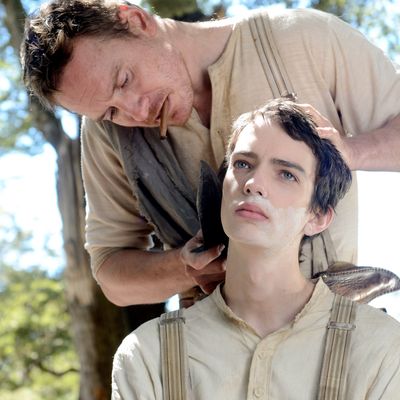
We originally reviewed Slow West when it premiered at Sundance in January. This piece has been updated upon the filmÔÇÖs official wide release.
As a cigarillo-chomping, preternaturally cool bounty-hunter helping a young Scots boy navigate the American frontier, Michael Fassbender does a pretty mean Clint Eastwood. Slow West, written and directed by musician turned director John Maclean (formerly of the Beta Band), is no ordinary Western, though FassbenderÔÇÖs Silas Selleck does seem at times like heÔÇÖs wandered out of our collective dreams of the genre; heÔÇÖs as much a comment as he is a stand-alone character.
Veering between the iconic and the bizarre, Slow West, which won the coveted World Cinema Dramatic Jury Prize at this yearÔÇÖs Sundance Film Festival, is an absurdist, episodic road movie; it owes more to surreal art films like Jim JarmuschÔÇÖs Dead Man than it does to surrogate father Westerns like Death Rides a Horse or The Searchers. Kodi Smit-McPhee plays Jay Cavendish, a young, inexperienced Scots aristocrat in 1870s Colorado pursuing the girl he loves, Rose (Caren Pistorius), who has fled to America with her father. Jay hooks up with Silas during a rather brutal run-in with some soldiers. (The violence in this film is always jarringly, even comically, sudden.) Little does Jay know, however, that Rose and her father have bounties on their heads, and that Silas is helping him in an effort to get to them first ÔÇö ahead of all the other bounty hunters in hot pursuit. Silas actually narrates the film, and he confesses his secret plan to us early on, but thereÔÇÖs still a hint of tenderness in his voice when he talks about Jay. We suspect that this stone killer may yet come around to the side of the just and the good.
ThatÔÇÖs a pretty good setup, but Slow West isnÔÇÖt really a movie about bounty hunters. Rather, itÔÇÖs an absurdist, melancholy coming-of-age tale that jumps from odd comedy to striking violence to stirring reflection. ThereÔÇÖs a grisly, goofy, ping-ponging general-store shootout that recalls the doughnut-shop scene in Boogie Nights. ThereÔÇÖs a dreamlike, absinthe-fueled reverie about gunfighter mythology and Western folk tales. ThereÔÇÖs a weird digression into Native American anthropology. Ben Mendehlson shows up looking like he wandered in off the set of The Great Silence. The filmÔÇÖs collage of impulses and influences doesnÔÇÖt always work. The jarring mix of tones may be intentional, but thereÔÇÖs a preciousness to many of the filmÔÇÖs more odd passages ÔÇö a kind of eagerness to disrupt that often feels calculated, even cheap. (Contrast that with Dead Man, whose visionary weirdness all felt of a piece.)
But if Slow West never quite settles on a tone to call its own, it does still offer many pleasures. For starters, itÔÇÖs beautifully shot. The New Zealand locations give the landscape a slightly off-kilter quality: The film looks like a Western, but something seems slightly off, which is a good way to describe it thematically as well. More important, Fassbender and Smit-McPhee are excellent. The boyÔÇÖs outward bewilderment and unpreparedness play off well against the cowboyÔÇÖs ragged, stone-faced charisma. But the boyÔÇÖs idealism ÔÇö the single-mindedness with which he pursues his romantic north star, and his dreams of domesticity ÔÇö also rubs off on the older man. Watching the two of them, you begin to wonder which one is doing more growing up. And a climactic gunfight, in which all of the filmÔÇÖs disparate elements and characters come together in an orgy of brutal, slapstick, sudden violence, is fantastically unpredictable. Slow West is kind of a mess, but thereÔÇÖs too much good stuff here to ignore.


